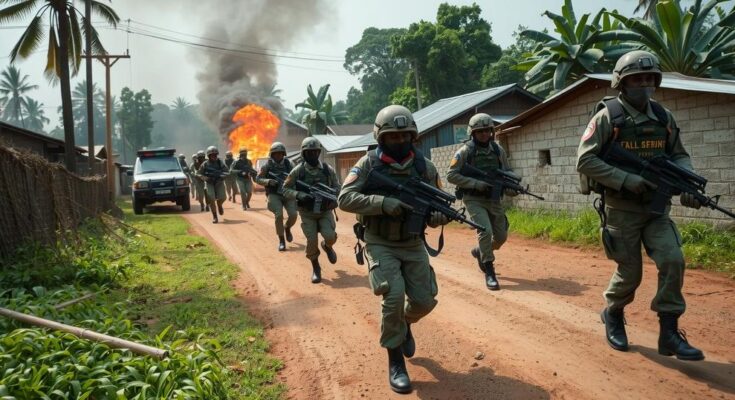M23 rebels have taken control of Masisi, a key town near Goma, exacerbating the conflict in eastern DRC. The takeover is part of their continued advancement, leading to thousands of displaced individuals seeking shelter. The DRC government is steadfast in restoring state authority, while accusations against Rwanda for support of the rebels continue to loom over the conflict.
In a significant development, M23 rebel fighters have captured the town of Masisi, located approximately 80 kilometers from Goma, the provincial capital of North Kivu in the eastern Democratic Republic of the Congo (DRC). This town, which serves as a local administrative center, has been described as strategically invaluable due to its mountainous terrain and rich resource base. Local politicians confirmed the takeover occurred on Saturday, with M23 positioned to potentially expand their territorial control in the region.
Alexis Bahunga, a member of the provincial parliament, reported the recent capture, while Jean-Pierre Ayobangira Safari, another parliamentary member, noted that Masisi is now under rebel control, albeit only temporarily. Corneille Nangaa, the leader of the Congo River Alliance, which includes M23, stated that the rebel forces had reached the center of the town on Saturday afternoon. The immediate aftermath of the takeover indicates a worsening security situation, prompting a mass displacement of residents seeking refuge in Goma, which itself has been overwhelmed by approximately four million displaced individuals due to ongoing violence.
The DRC government, led by President Felix Tshisekedi, has vowed to reassert state authority, although he maintains a firm stance against engaging in dialogue with the M23. The situation remains precarious, exacerbated by accusations against Rwanda for allegedly supporting M23, a claim that Rwanda vehemently denies. Recent attempts at peace talks, facilitated by Angola, were abruptly halted in December over disagreements, leaving the region in turmoil.
Masisi, with an approximate population of 40,000, is largely dependent on agriculture and mining, making its capture by M23 a monumental gain for the armed group, raising concerns about the security of surrounding economic hubs such as Goma and Bukavu. The ongoing conflict has resulted in a serious humanitarian crisis, with nearly a million people forced from their homes in the last year alone, as M23 continues to exploit the resource-rich areas of eastern DRC.
The M23 group has a long history of conflict in the eastern Democratic Republic of the Congo, originating from ethnopolitical tensions that arose post-Rwanda’s 1994 genocide, particularly among the Tutsi population. Since its emergence over a decade ago, M23 has been at the forefront of violence in the North Kivu province, frequently clashing with government forces and causing widespread humanitarian crises. The area is rich in natural resources, making it a focal point for both illegal exploitation and international scrutiny. Current hostilities reflect not only local issues but are also exacerbated by regional dynamics, particularly the alleged support from Rwanda. The conflict has displaced millions, contributing to one of the world’s most pressing humanitarian emergencies, and has kept the region in a state of instability, further complicating peace initiatives.
The recent capture of Masisi by M23 rebels marks a significant escalation in their military campaign in eastern DRC, raising alarms over the potential implications for the province’s strategic economic centers. The government’s insistence on not engaging in dialogue with the group coupled with ongoing regional tensions adds complexity to an already volatile situation. The humanitarian toll of such conflicts continues to escalate, with an urgent need for comprehensive international attention and intervention.
Original Source: www.aljazeera.com




